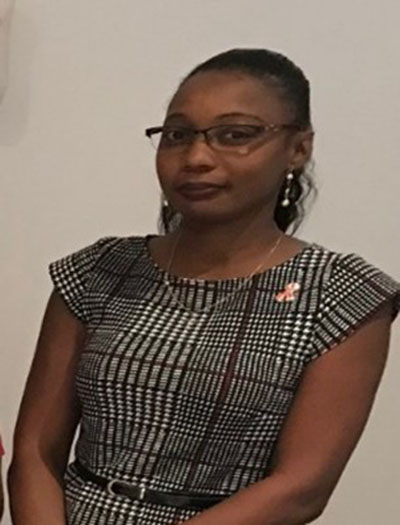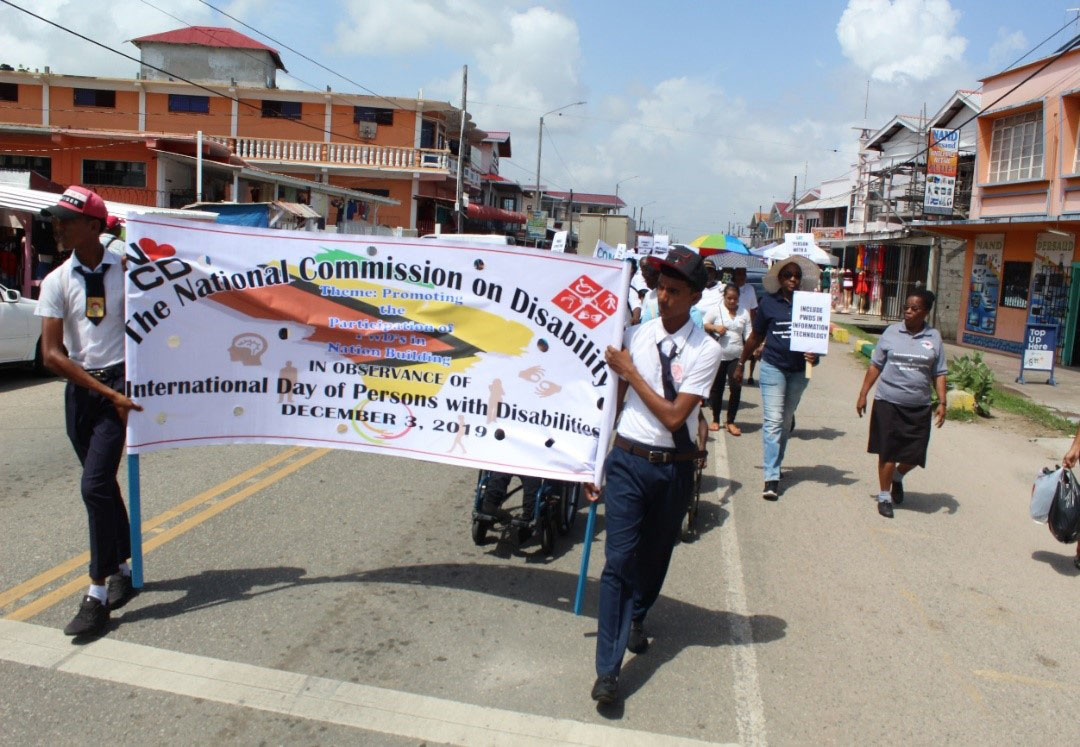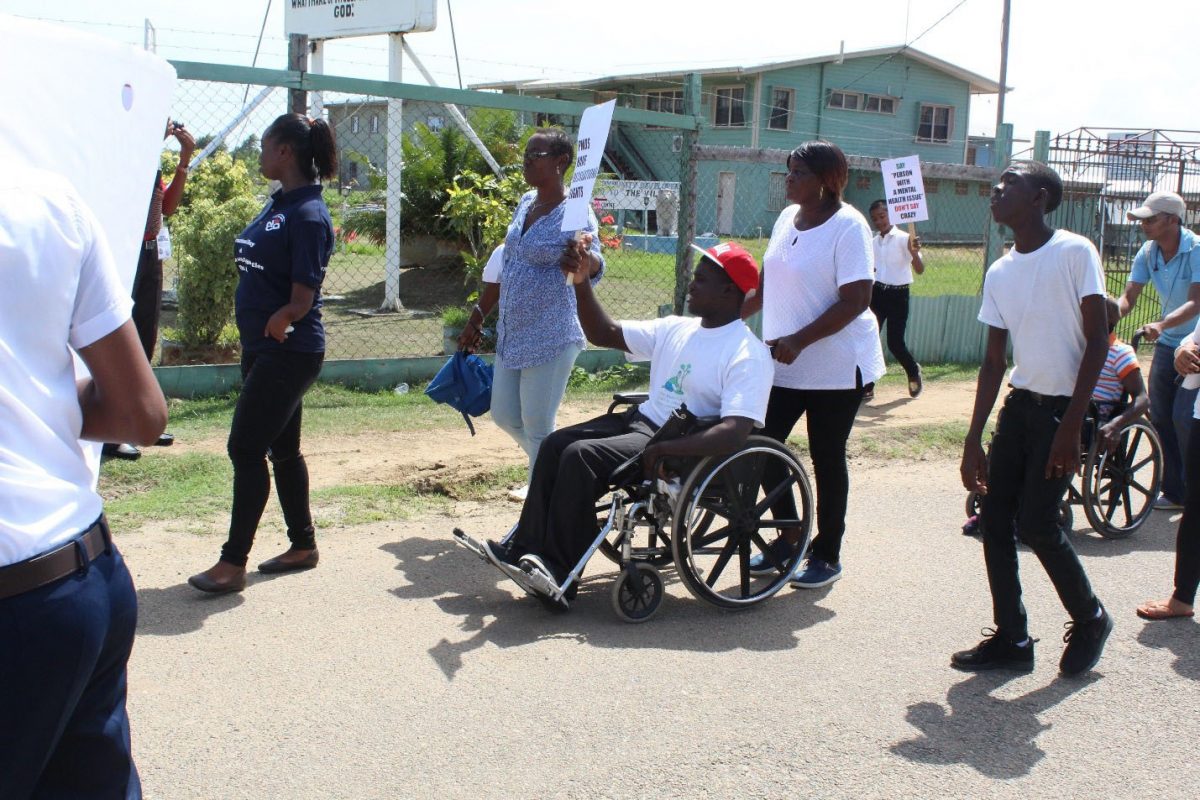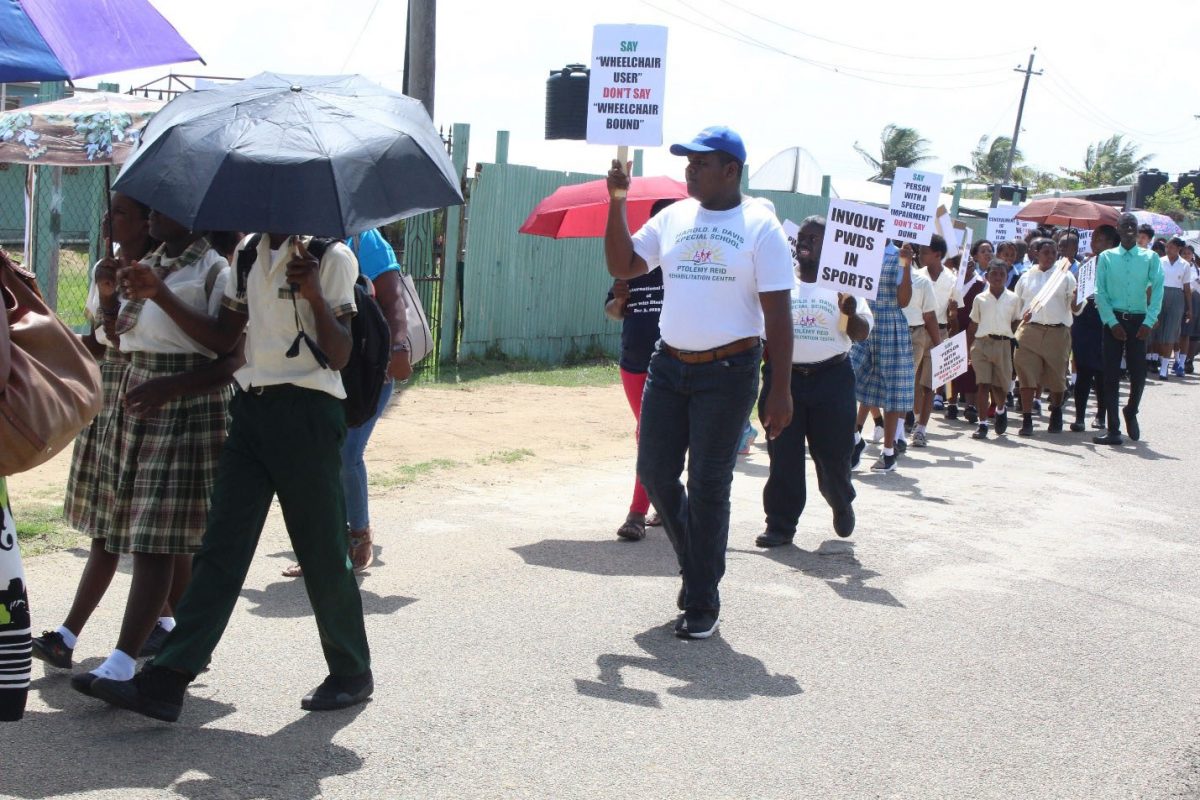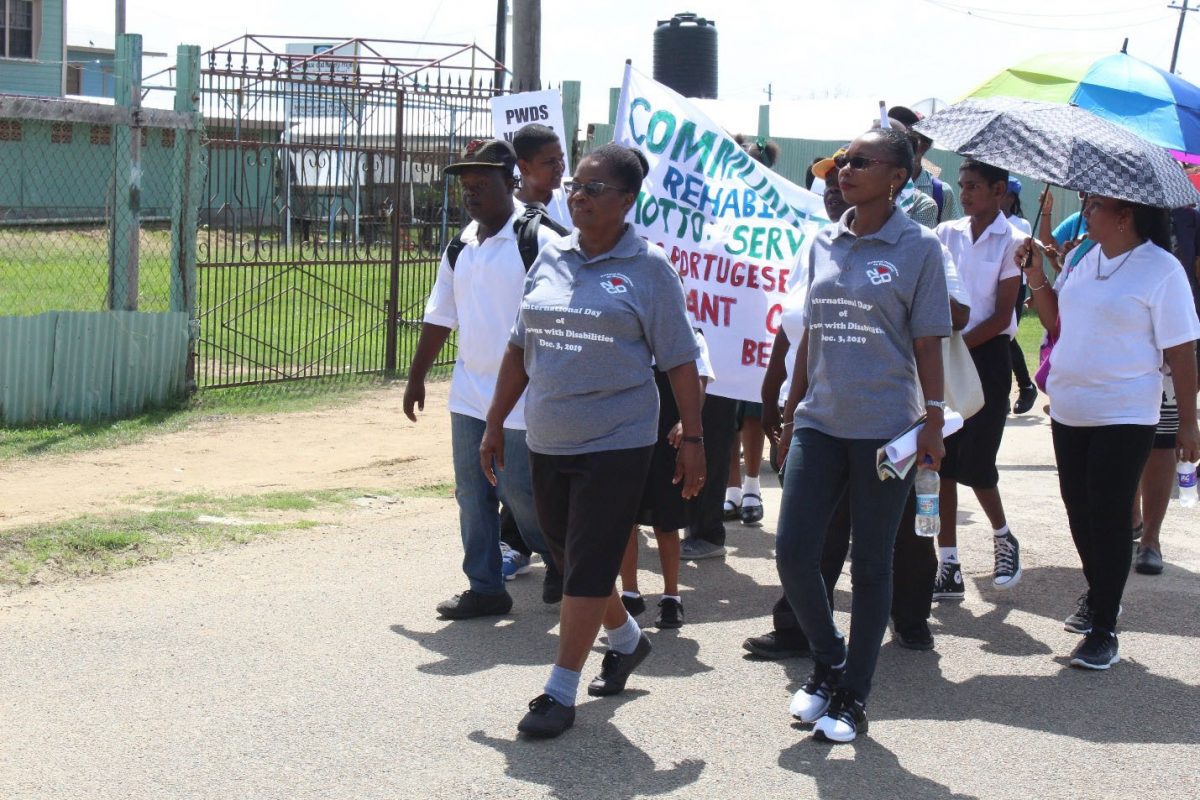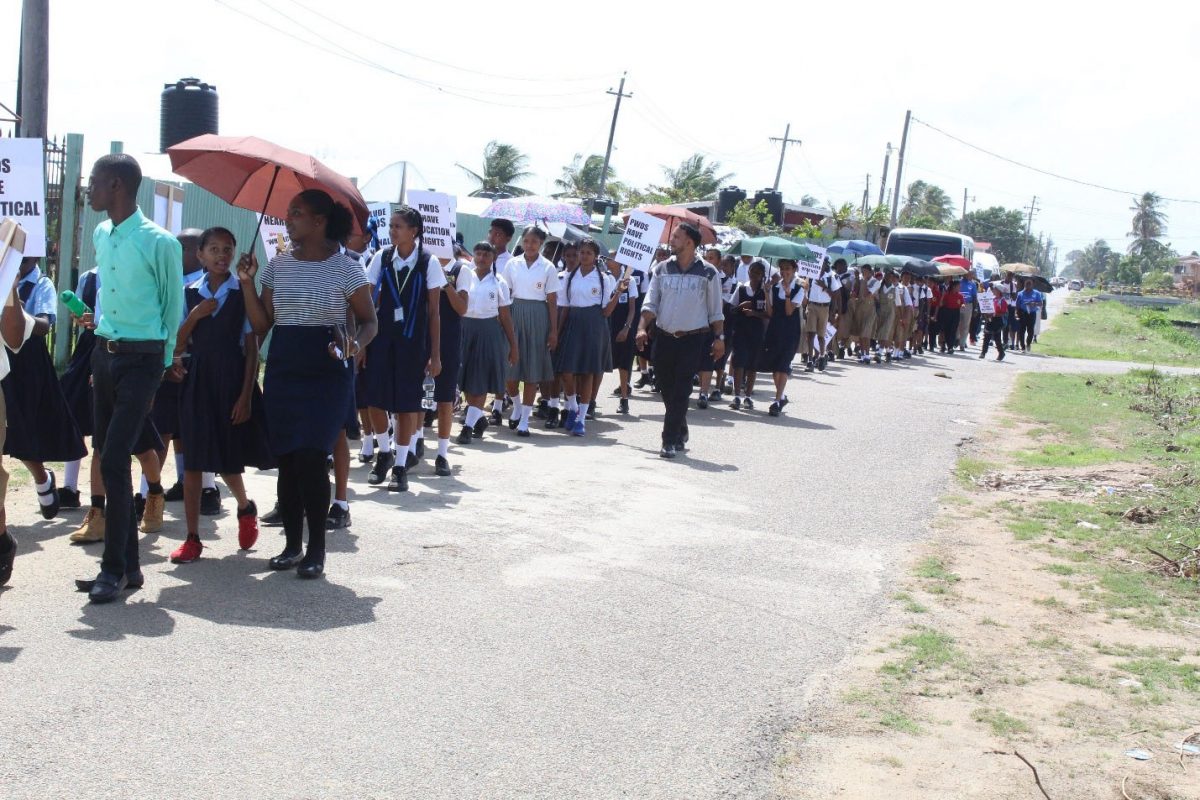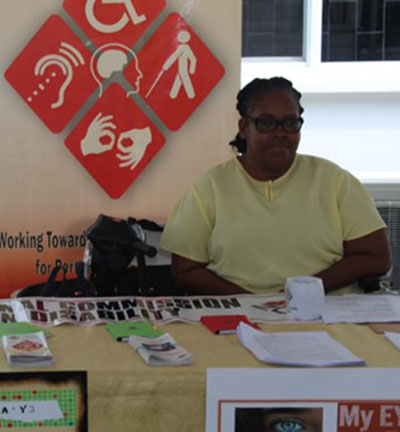When Simone Poole was seven-years-old, she had a collision with a schoolmate that left her immobile for more than a day and after she regained movement in her legs, her gait was never the same.
She often struggled to walk and at one time was forced to hold on to walls and furniture to get around. When she became pregnant with her first child, the doctor suggested that carrying the baby to full term would adversely affect her condition. She chose to do so and shortly after she gave birth to her daughter, she lost the limited mobility she had.
Over the years, before this occurred, she had experienced severe stigma and discrimination and like many people with disabilities, suffered the harshness of an unsympathetic Guyanese society.
Poole told Stabroek Weekend in a recent interview that she would be called “bruk-up” because of the way she walked.
After one year of secondary school, she was forced to quit because she could no longer climb the stairs. Efforts to study later did not work out, but Poole said she always tried to remain positive. Poole gave instances of being yelled at as she manoeuvred her motorised chair on the road with her two children, with inconsiderate people telling her that she should be at home. But by then she was bolder, adding, “if I am in the mood, I would answer them and tell them I have a right to be on the road just like them.”
But even as she recalled those instances, Poole, who is employed at the National Commission on Disability, said Guyana has come a long way as it relates to persons living with disabilities.
She along with the commission’s Advocacy and Communications Officer Avonel Corrica believe that much has changed over the last ten years, owing to all of the sensitisation work that has been done and with more public and private organisations coming on board. “We are getting there, but slowly. We can’t say that nothing has been done because it is different in comparison to ten years ago,” Corrica said.
And so as Guyana joined the rest of the world on December 3rd to observe International Day of Persons with Disabilities, which is an observance promoted by the United Nations since 1992, the more than 25,000 persons living with disability in this country might not have had a lot to cheer about, but there are still some successes to celebrate.
As Poole works with and for people with disabilities, Poole said this has helped her to overcome the difficulty she faces travelling in public, but she agrees that many persons still face it. “But the stigma and discrimination to persons with disability is not like before because people are more informed. More need to understand that disability is not something you purchase, it is something that can happen to anyone and the negative reaction is not called for,” she said.
Complaints
The commission was established in 1997 and its motto is, ‘Working towards the fulfillment of rights of persons with disabilities’. It became a statutory commission in 2010 and was guided by the 2010 Act, which outlines how it should function. The Board is made up of 12 commissioners who come from the government ministries and also someone who has a child with a disability.
Corrica said the commission has a complaints desk, which received seven complaints from last year to this year and they have been centred on employment. In one case, the complainant was rehired in another position, after she was dismissed because she was too slow in completing tasks.
The communications officer said it was unclear why persons are not coming forward to make complaints; she does not know if they are afraid.
She said while persons are being discriminated against, the commission will be unable to intervene if a complaint is not made. There have been cases where the commission intervened when a deaf person was assaulted, and the police were unable to take a statement. The commission sent someone who understood sign language and was able to assist the police in taking the man’s statement; the case is now progressing.
There was also an instance where the commission assisted the Ministry of Social Protection in dealing with a deaf couple.
“There are cases, whereby, even though we are not part of these organisations, once they call us, we provide whatever service to help the PWD [Person With a Disability] as opposed to not doing anything,” she said.
Corrica called on Guyanese to learn and understand disabilities, while pointing out that some are acquired and therefore anyone could become a person with a disability. She said once persons are knowledgeable about disabilities, they tend to do things differently. “I would encourage persons to learn about disabilities and to treat persons with disabilities the way they would want to be treated because disability can happen to anyone at any time,” she said.
Her position has helped her to learn and understand more about persons living with disabilities and how life can be easy for them once those in charge make the provision for them.
Data collection
Importantly, the commission has embarked on a data collection process that involves a national household survey of persons living with disabilities. So far, it has completed Regions 2, 3, 5, 6 and 10 and it shows that there are approximately 25,000 persons living with disabilities in Guyana. Corrica said they embarked on the process following the 2002 national census, which calculated that a little over 6% of people live with disability in Guyana, but she said that was not the entire picture. They got this figure, according to the communication officer, because they counted the disability types which meant that a person living with three forms of disability was counted as three persons instead of one.
“Because of that we embarked on the house-to-house survey to get it right,” she said, adding that before they commenced the work there was a thorough training of the field staff and the coordinator. It is hoped that the survey of the other five regions will be completed by next year or the following year. This is to ensure that there is accurate data about, “where these people are, their needs, their capacities, whether they need employment, their education background…,” she said.
This data will be shared with ministries and departments. For example, Corrica said that should the Ministry of Education make a request on completion of the data collection, the commission would be able to tell them how many children with disability are not in school and where they are located. This can help them to build a school or create a department in a school to assist those children. They can also inform the Ministry of Social Protection about the needs of disabled persons.
“We want to share the information so that departments can make their plans to include PWDs,” she said.
Corrica said over the years the commission has focused on sensitisation about the Disability Act, ensuring persons are aware of the content of the act. It also visits places that are not accessible to persons living with disabilities and assists in getting them to that point.
Their work also includes meeting various government ministers and letting them know their responsibilities under the act. So far, she said, Minister of Public Communications Catherine Hughes and Minister of Public Works David Patterson have been very open towards working with persons with disabilities and making services available to them. Most of the wharfs now have ramps and the toilets are now more accessible since Patterson has been in office.
The commission receives a subvention from the Ministry of Public Health and as a result they are in constant contact with subject Minister Volda Lawrence. Corrica said at times they are unable to complete certain tasks because of the lack of staff – they are just seven in number. They are currently working with a strategic plan which helps them to, among other things, strengthen their capacity internally. She said there are rehabilitation centres, set up through the ministry, in all 10 regions and the commission assists with their work.
Voices must be heard
Meanwhile, for the Guyana Council of Organisation for Persons with Disabilities (GCOPD), the powers that be, in accordance with the Persons With Disabilities 2010 Act, should ensure that the inherent human rights of all PWDs are fulfilled and they have an equal opportunity to live independent, dignified and productive lives.
“Any development agenda in Guyana must consider the voices of persons living with disabilities. This will ensure that their rights and needs are clearly communicated and understood. For this reason, whenever policies, infrastructure and other initiatives are planned, developed and implemented, it should always be done with the meaningful input of the affected population. We also call on all members of our Guyanese society to play a role in ensuring PWDs live in a barrier-free society with limited instances of discrimination,” Ganesh Singh, Programme and Communication Officer of GCOPD wrote in a letter published last week.
In the letter, Singh said the GCOPD, which represents the majority of disabled persons organisations in Guyana, is calling on policymakers to develop a programme for the allocation of a monthly disability grant to qualified PWDs, as a living allowance. This grant, he added, should be administered separately from the public assistance grant. They should also ensure that qualified and skilled PWDs are allocated a small percentage of all public sector jobs and ensure that all public schools are accessible and are governed by a relevant special education needs policy that promotes the integration and full participation of children with disabilities, ensuring they acquire a meaningful education.
Also, Singh said the GCOPD is asking policymakers to ensure that all public buildings are accessible to PWDs, in compliance with the Guyana PWD Act 2010, that PWDs have an opportunity to participate in our electoral process and can vote independently, and that PWDs have a voice in the expenditure of the revenues from the oil and gas sector.
